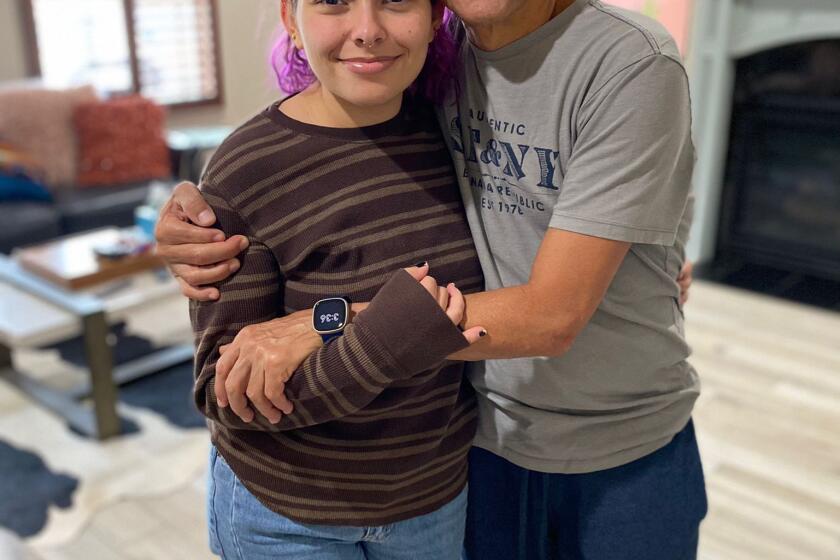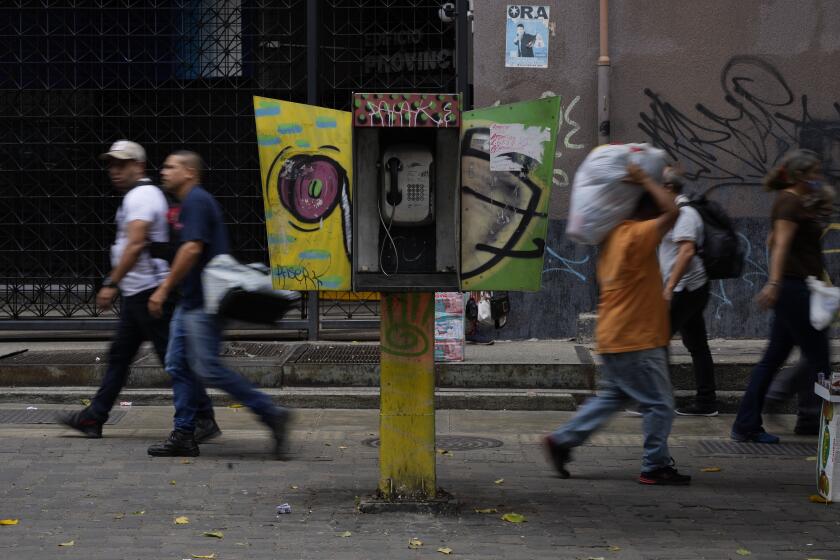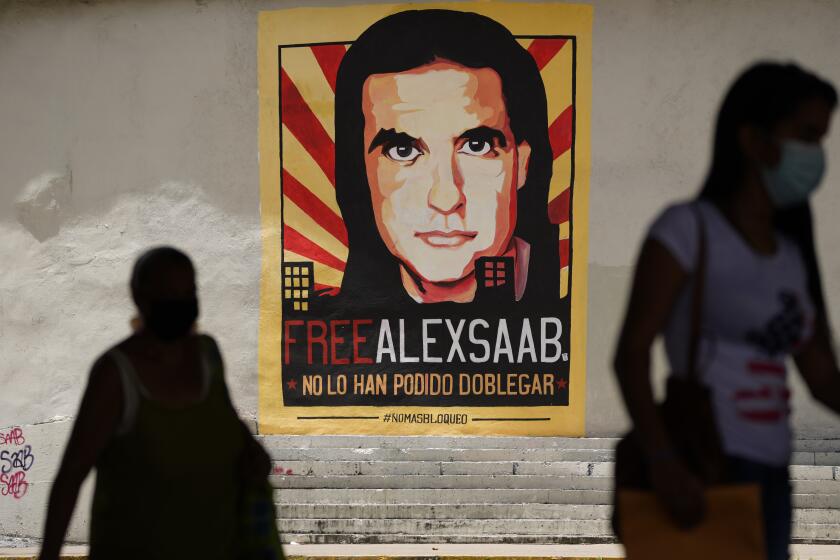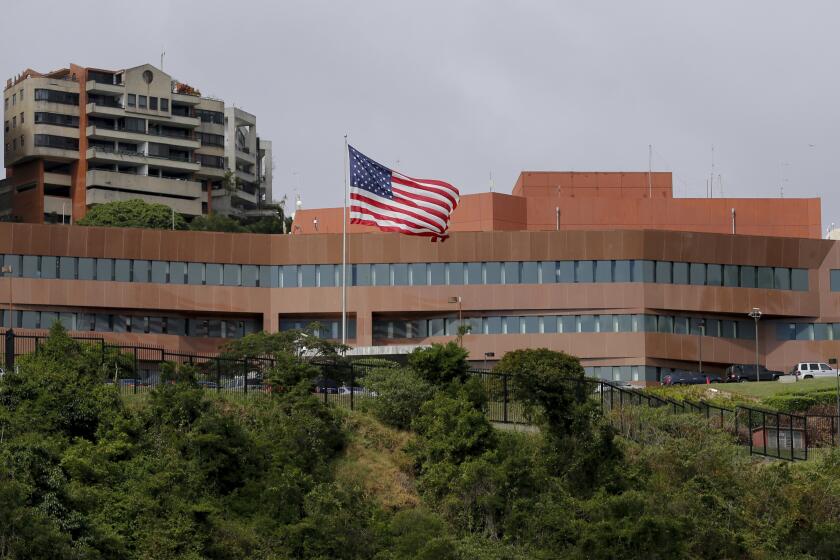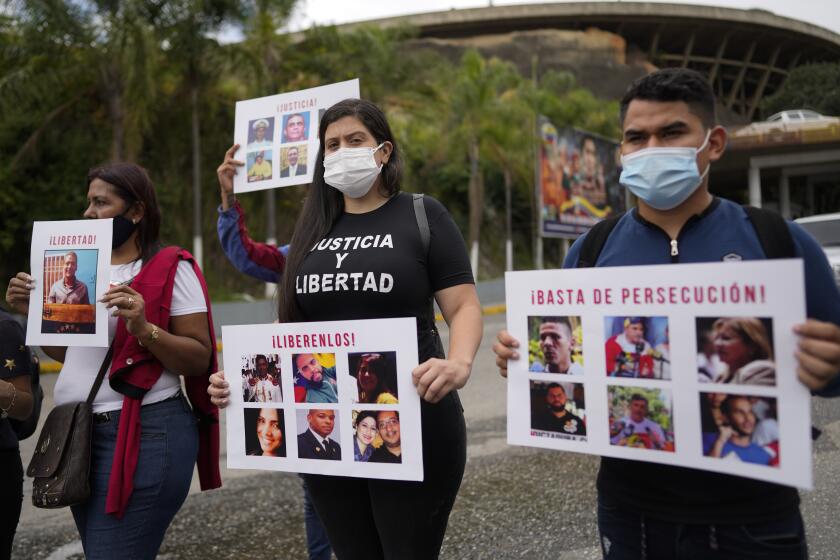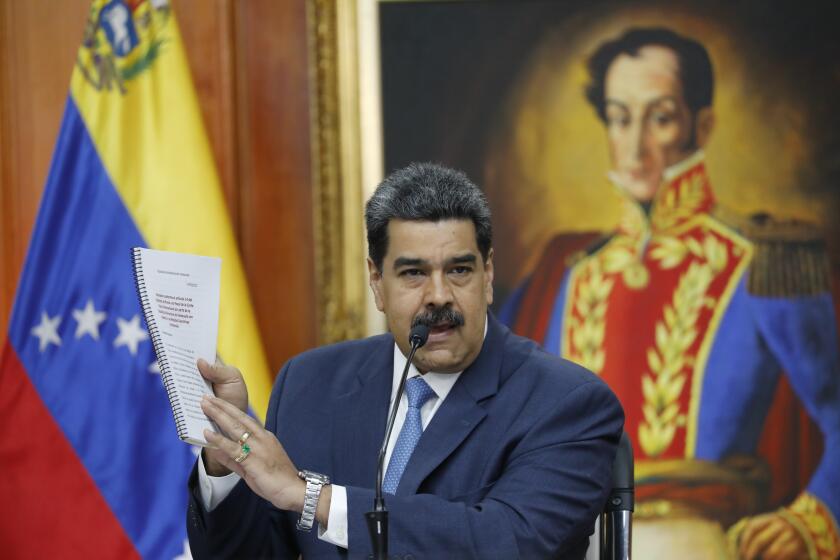L.A. lawyer among Americans jailed in Venezuela as U.S. tries to improve relations
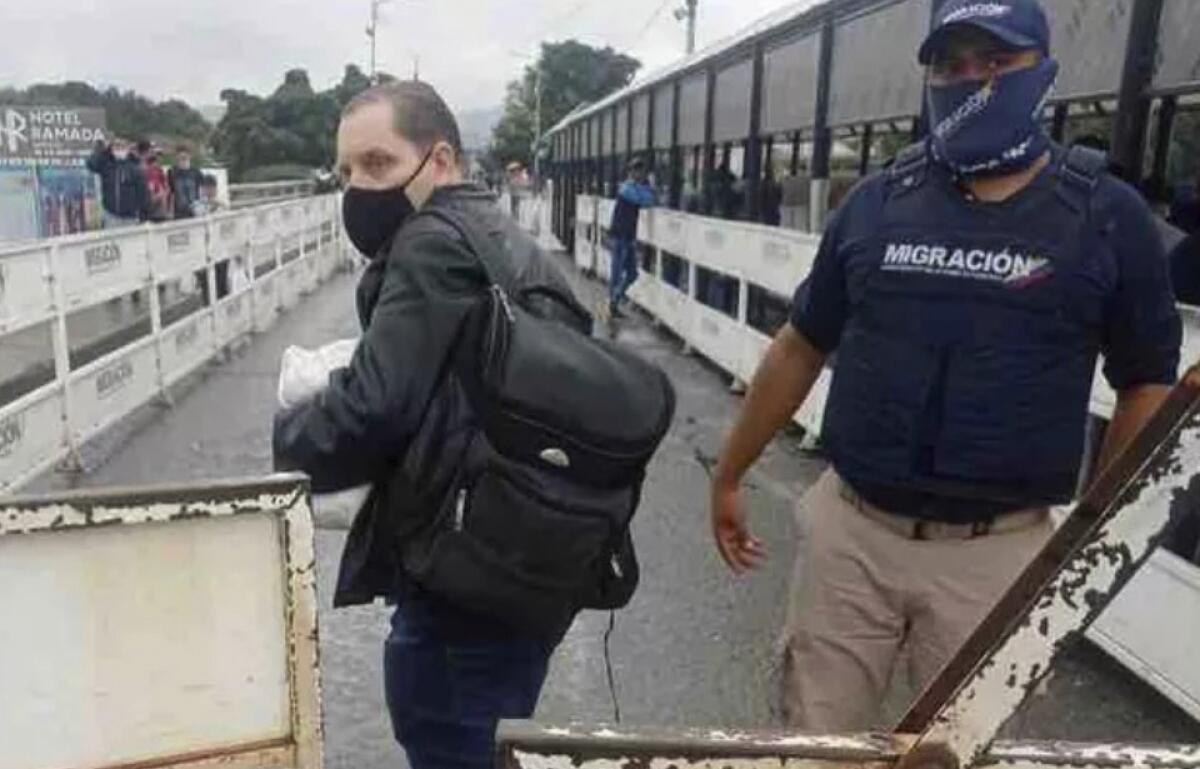
- Share via
CLEVELAND — Three Americans, including a lawyer from Los Angeles, were quietly jailed in Venezuela earlier this year after allegedly trying to enter the country illegally and now face long prison sentences in the politically turbulent nation.
Two of the men — L.A. attorney Eyvin Hernandez, 44, and a computer programmer from Texas — were arrested in late March, just days after Venezuelan President Nicolás Maduro’s socialist government freed two other Americans.
Venezuelan security forces arrested Hernandez, who earned a law degree from UCLA, and computer programmer Jerrel Kenemore, 52, in separate incidents in the western state of Tachira, according to a person familiar with investigations into the arrests. The person spoke to the Associated Press on condition of anonymity for lack of authorization to discuss the cases publicly.
Kenemore is from the Dallas area but had lived in Colombia since 2019.
A third American was arrested in January, also on suspicion of entering Venezuela illegally along its lengthy border with Colombia. The AP is withholding his name at the request of his family, which fears retaliation.
At least eight more Americans — including five oil executives and three veterans — remain imprisoned in Venezuela, and U.S. officials insist that they are being used as political bargaining chips.
The release of two jailed Americans came hours after Venezuelan President Nicolás Maduro signaled an interest in improving relations with the U.S. amid Russia’s war on Ukraine.
The latest arrests come amid efforts by the Biden administration to unwind the Trump-era policy of punishing Maduro for what Trump administration officials regarded as trampling on Venezuela’s democracy. Biden officials are trying to lure Maduro back into negotiations with the U.S.-backed opposition to pave the way for free and fair elections.
As part of that still-early outreach, the U.S. has dangled the possibility of easing sanctions on the oil-producing nation — a move that, over time, could also help lower oil prices, which spiked following Russia’s invasion of Ukraine.
The release of two Americans on March 8 was celebrated in Washington, giving a boost to the Biden administration’s outreach to Maduro. It’s not clear what impact, if any, the jailing of three more Americans will have on relations with Maduro, a close ally of Russia whom the U.S. has sanctioned and indicted on narcotics charges.
The State Department confirmed the three arrests, and a spokesperson said officials were pressing for the immediate release of all wrongfully detained Americans in Venezuela.
Venezuela’s government is seeking private investors to pump funds into vital but crippled state-run companies, decades after seizing them.
Beyond any political fallout, the arrests point to what U.S. officials consider an alarming trend: the arrest of unsuspecting Americans along the Colombia-Venezuela border, a lawless area dominated by criminal gangs and leftist rebels. Americans trying to enter Venezuela without a visa are especially vulnerable.
Despite Maduro’s often fiery rhetoric against the U.S. “empire,” there’s no indication that he is targeting Americans for arrest.
But with the South American country torn apart after years of political unrest, hyperinflation and devastating food shortages, Maduro’s grip on his poorly paid security forces is shaky. That’s created an opening for criminal elements and hard-liners looking to spoil Maduro’s talks with the U.S.
“There’s a lot of different centers of power in Venezuela, and not all of them are aligned with Maduro or share his goal of seeing talks with the U.S. advance,” said Phil Gunson, a Caracas-based analyst for the International Crisis Group.
A senior U.S. official says that a top fugitive close to Venezuela’s socialist government has been put on a plane to the U.S. to face money-laundering charges
In one arrest report seen by the AP, Venezuelan military counterintelligence agents justified their actions by citing the U.S.’ “constant threats, economic blockade and breaking of diplomatic relations.”
Some top Venezuelan officials also justify the arrest of Americans. In a June 13 news conference announcing the arrest of another American, Socialist party leader Diosdado Cabello said: “They have their plans against our country.”
Hernandez, who was arrested March 31, was supposed to appear in court Monday, but the hearing was postponed.
Hernandez migrated to Los Angeles as a toddler with his parents, who were fleeing the civil war in El Salvador. After graduating from UCLA’s law school, he turned down lucrative jobs to work instead as a public defender representing indigent and sometimes homeless defendants, a sign of his charitable spirit, friends and relatives said.
The U.S. diplomat has found a rare path back into Venezuela a year after leaving the South American nation amid a historical break between the two political foes.
Like Maduro, Hernandez loves salsa music and has a history of labor activism. An avid traveler, Hernandez was taking a short break from work when he traveled to Colombia, where he’s been several times before, his brother said. Right before he was due home, he accompanied a Venezuelan friend to the border. His family said it was never his intention to go to Venezuela, nor would he knowingly break the law.
Hernandez has been charged with criminal association and conspiracy — crimes punishable by up to 16 years in jail. His friend is also being held and faces the additional charge of migrant smuggling, according to the person familiar with investigation.
“My entire family deeply misses my brother,” Henry Martinez, who also lives in Los Angeles, said in a statement. “He has worked his entire career serving marginalized people and he is truly the best of us. We hope and pray that Eyvin can return home very soon from this mistaken arrest.”
Two weeks before Hernandez’s arrest, Kenemore was taken into custody in similarly murky circumstances.
The international court’s probe of alleged crimes against humanity in Venezuela marks the first time a Latin American country has faced such scrutiny.
According to Kenemore’s family, he had been living in Colombia for over a year with a Venezuelan woman he met online when both were getting over divorces. The two shared a small apartment where Kenemore was working remotely for a client in the U.S., but had decided to relocate to Venezuela, where his girlfriend had a home.
Kenemore’s family said he was detained by migration officials upon entering Venezuela, according to a GoFundMe page they set up to pay for his defense. They posted on the crowdfunding platform what they said was the last photo of him before his arrest, near a Colombian border checkpoint on the Simon Bolivar international bridge.
Prosecutors allege that Kenemore, his girlfriend and three others entered the country on a nearby dirt trail, one of hundreds of irregular crossings used daily by Venezuelans shuttling between the countries for groceries, medical appointments and family visits. They said he was carrying three laptops and was accompanied by a captain in the Venezuelan navy, something that also raised suspicions.
Like Hernandez, Kenemore was charged with criminal association and conspiracy. His girlfriend is also being held.
Breaking News
Get breaking news, investigations, analysis and more signature journalism from the Los Angeles Times in your inbox.
You may occasionally receive promotional content from the Los Angeles Times.
“Jerrel is a good American, Christian man,” Jeana Kenemore Tillery, his sister, said in a phone interview. “All he wanted to do was be with the woman he loved. His sisters, children and grandson miss him very much and we just want him home.”
In April, the State Department warned about threats to Americans along the Colombia-Venezuela border. It recommended that Americans avoid all travel to Venezuela, and never to enter without a visa, which is nearly impossible to obtain since the U.S. broke diplomatic relations with Maduro in 2019.
According to Venezuelan law, foreigners found in the country without a visa are to be immediately deported.
But for reasons that are unclear, all three men arrested earlier this year were transferred hundreds of miles away to the capital, Caracas, to a maximum-security prison housing many of Maduro’s opponents.
The White House issues a temporary protected status decree that could allow tens of thousands of Venezuelans who fled their homeland to remain in U.S.
Americans jailed in Venezuela are at a disadvantage when it comes to seeking help from their government. The U.S. closed its hilltop embassy in Caracas in 2019, after recognizing opposition lawmaker Juan Guaidó as the nation’s legitimate leader.
The United Nations has long complained about the lack of independence for Venezuelan judges as well as about the facility where the Americans are being held.
“It’s not a legal system one wants to get trapped in,” said Gunson of the International Crisis Group.
More to Read
Sign up for Essential California
The most important California stories and recommendations in your inbox every morning.
You may occasionally receive promotional content from the Los Angeles Times.
